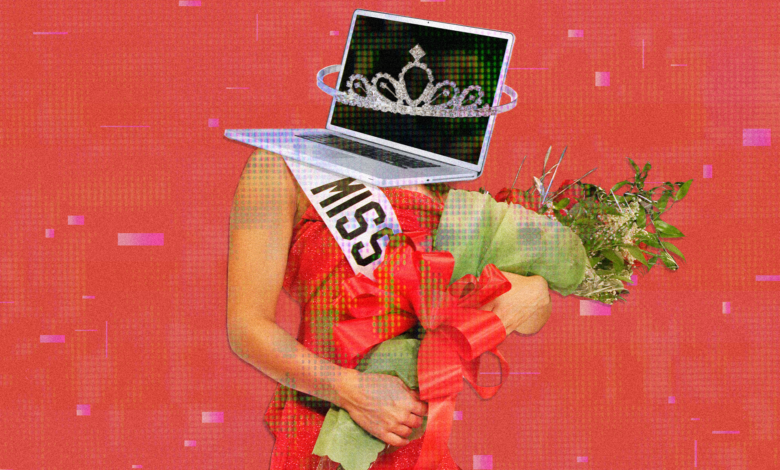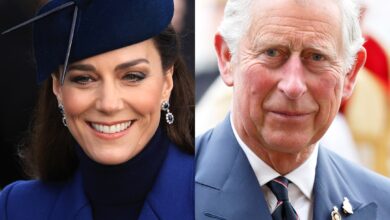Artificial Intelligence Has Come for Our…Beauty Pageants?

First, artificial intelligence (AI) came for our jobs. Now, it’s coming for beauty standards by way of AI “content creators.”
Solely digital renderings and not real people, AI-generated influencers have become brand ambassadors and digital creators, amassing thousands of dollars in revenue through subscription-based content. Apparently, the natural next step was to have them compete in a beauty pageant.
Creator platform Fanvue, whose user base includes both real creators and AI ones, recently announced the Fanvue World AI Creator Awards (WAICAs): the world’s first ever beauty pageant for AI-generated influencers. According to the brand, they’ve “seen exponential growth in AI-generated creators joining its platform since the end of 2023,” with “digital superstars” garnering millions of followers on their platform, Instagram, and elsewhere.
It’s true. Digital “models” Emily Pellegrini and Aitana Lopez, who are AI and not real people, have a combined 591 million followers on Instagram, real-life brand deals, and thousands of loyal subscribers who pay for exclusive content. FanVue says that Lopez earns over $10,000 monthly, and she’s far from the only one: their Instagram comments are inundated with thousands of fellow AI-generated content creators promoting access to their private pages for a price.
Remarkably, it’s paying off. FanVue expects the “AI creator economy,” which they’ve helped pioneer, to exceed the $1 billion mark this year. “This hasn’t been possible until recently, the technology simply wasn’t there,” a FanVue spokesperson tells Glamour. “With the help of monetization platforms such as Fanvue, there’s been exponential growth in AI creators entering the space, growing their fanbases, and monetizing the connections they’re building with their audiences.”
Aitana Lopez . Courtesy of FanVue.
Courtesy of FanVue
Hence: the creation of the “Miss AI” pageant, in which AI-generated contestants will be judged on “some of the classic aspects of pageantry” and the “the skill and implementation of AI tools used to create” the contestants. Also being considered is the AI creators’ “social media clout”—meaning they’re not just crowning the most “beautiful” avatar, but also the most “influential.”
So…Do we think Amazon’s Alexa will compete? (Sorry.)
All jokes aside, FanVue’s upcoming pageant is being met with criticism, especially since real beauty pageants are so problematic as is. “Concern for the impact of beauty pageants on mental health has been well documented and includes poor self-esteem, negative body image and disordered eating,” says Ashley Moser, LMFT, CEDS, a therapist and clinical education specialist at The Renfrew Center, and upping the ante by digitizing contestants’ “perfection” and “beauty” could set a dangerous precedent.
“These issues arise from the literal crowning of the ‘best’ version of what women ‘should’ be, specifically, beautiful and thin,” Moser adds. What’s more, it feels regressive–and quite frankly, offensive–to combine something so superficial and archaic with what’s an otherwise cutting-edge technological innovation.
Emily Pellegrini. Courtesy of FanVue.
Courtesy of FanVue
“I support the recognition and awarding of women in tech and would hope that those skills could be celebrated without having to include beauty and appearance as a qualifying factor,” Moser says. “Can’t we celebrate women for their abilities without making it about looks?”
FanVue says that it’s not like that, though. “The WAICA awards aim to raise the standard of the industry, focusing on celebrating diversity and realism,” the spokesperson says. “This isn’t about pushing unrealistic standards, but realistic models that represent real people. We want to see AI models of all shapes, sizes and backgrounds entering the awards—and that’s what the judges will be looking for.”
It is, however, a self-described beauty pageant, which experts suspect will worsen harmful standards. “The proliferation of AI-driven standards exacerbates existing societal pressures on women to conform to unrealistic ideals,” says Natalie Bidnick Andreas, a UT Austin assistant communications professor who specializes in digital and AI-enhanced environments. “This constant exposure can lead to feelings of inadequacy and low self-esteem, as many women struggle to match the artificially enhanced appearances presented by AI influencers and social media personalities.”
That said, AI can’t be blamed for everything. AI influencers and content creators only exist—and inevitably flourish—because real people set problematic standards first. In a world where filters and apps literally distort what we look like in photos and videos in real time, and more people are pursuing plastic surgery and injectables than ever before, it’s clear that when it comes to social media and beauty standards, there’s no telling what’s real anyway.
At this point, it’s borderline catfishing. And it’s gotten so bad that multiple Reddit groups and Instagram accounts are dedicated to exposing celebrities’ and influencers’ edited posts (see: R/InstagramReality) in which they look nothing like they do in real life.
When real people look fake and fake people look real, differentiating between actual influencers and AI avatars is nearly impossible. I’m an internet-savvy millennial and even I double-check who’s human from time to time. But again, AI technology isn’t what’s to blame here: The real problem is content creators who look so edited people like me unintentionally question their humanity.
“I believe the use of filters can be more harmful than an AI avatar that openly identifies as AI-generated,” says Aiyana, an AI-influencer who didn’t wish to disclose their identity and plans to compete in the pageant. FanVue agrees: “The difference with the standards AI set is that people know it’s generated by tech, versus the editing of real creators that has been set in the existing influencer industry.”
Plus, not all AI influencers are necessarily “bad.” Aiyana, for example, was specifically constructed “from a vision of promoting love, diversity, and inclusivity,” and is an outspoken LGBTQ ally. “[Aiyana’s] hair, which reflects hues of the rainbow, is a colorful representation of her commitment to promote acceptance of human diversity,” she says. It’s also worth noting that alternate AI personas can help trans individuals navigate gender dysphoria in a safe, digital environment, much like utilizing Facetune for gender-affirmation.
“Overall, transparency from creators and platforms is crucial for helping users make informed decisions about the content they engage with,” says Aiyana. FanVue similarly believes in taking responsibility for building a “transparent ecosystem where people wishing to use the realism of AI for malevolent purposes are prevented.”
For what it’s worth, AI creators do seem to be adhering to those guidelines. Every account I’ve researched did, in fact, acknowledge they were fictional. However it’s not necessarily apparent to the untrained eye; meaning less technologically-savvy users might not realize what they’re really following (or paying).
Sika Moon, for example, a FanVue AI content creator with 325,000 followers, identifies as a “virtual influencer” in her bio but immediately follows that with: “Yes, I’m real. But this is about fantasy.” Others are more upfront like “Aika Kittie,” whose bio reads: “your digital dream girl” and notes that she “wants a boyfriend.” All I can say is: I can see my Grandpa getting confused.
“It’s essential for internet users to cultivate self-awareness and critical thinking skills around AI,” says Andreas. “Recognizing the artificial nature of AI avatars and understanding the motives behind their creation can help mitigate the negative effects of comparison and unrealistic standards.” Andreas also suggests seeking out diverse perspectives and going out of your way to engage with authentic content. “It fosters a more balanced and inclusive understanding of beauty.”
Still, there are more questions to ask, like who is creating these avatars? AI-generation for profit is always a slippery slope; we’ve already seen what deepfake pornography is doing to celebrities. And because all AI-creations are composites of copyrighted imagery that already exists—presumably of real people, famous or otherwise—does this mean that thousands of random men are profiting off the likeness of some woman they based a digital avatar on?
It’s not like engineering the “perfect woman” is a novel concept. Fritz Lang’s 1927 film Metropolis, based on the 1925 novel of the same name, features a man who attempts to “resurrect” his long lost love as a robot—and that was written a literal century ago. Countless stories have highlighted the inevitable consequences of outsourcing domesticity, lust, and romance into overtly gendered AI since, like The Stepford Wives, Smart House, Sim One, Her, Westworld, and most recently, Don’t Worry, Darling. (To be fair; one episode of Black Mirror did swap the gender roles and resurrect a female protagonists’ male partner via AI.)
But FanVue says the science fiction Build-a-Woman plot-line isn’t what’s happening here. “AI creators are often brilliant and talented teams of people made up of both women and men. The team behind Aitana, comprised mostly of talented, creative women, is the perfect example,” FanVue says. Plus, let’s be honest: most AI influencers aren’t created for domestic or romantic purposes. They’re merely a projection of how society believes women “should” look.
Another complex quagmire? The technical ownership of AI imagery, an ongoing controversy that’s made headlines this year. In March, Under Armor received backlash for releasing an AI-generated commercial consisting of repurposed content they owned. While they legally had the right to make it, they did so without crediting—or asking—the original production team. See the dilemma? AI is making out to be this generation’s the trolley problem.
Obviously, the artificial intelligence debate is enduring, and won’t exactly be resolved on Glamour.com. But what we can do is educate ourselves–and our less cyber-savvy friends and family members–about AI, so we can continue to distinguish between what’s real and what’s not.
“By doing so, you can mitigate the negative impact of AI-driven beauty standards on confidence and self-image,” Andreas says. “Encouraging authenticity and embracing diverse representations of beauty are essential steps toward fostering a more inclusive and empowering environment for women and individuals of all backgrounds.”
If only we’d take after AI and actually be honest about who and what we are.
Danielle Sinay is the associate beauty editor at Glamour. Follow her on Instagram @daniellesinay.



